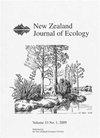将科学与土著知识联系起来:kaitiakitanga、保护和资源管理
IF 1.4
3区 环境科学与生态学
Q3 ECOLOGY
引用次数: 4
摘要
:土著知识为应对环境威胁和压力提供了有效的解决方案。使用充分包括土著概念、思想、世界观、知识、过程和实践的方法有助于恢复受威胁物种和濒危生态系统,但这类工作必须与土著人民接触,并且这种接触是尊重、互惠和有意义的。我们支持在科学的同时使用毛利知识、文化、价值观和世界观,因为融入社会文化观点和举措可以以更全面的方式解决可持续性问题。这个由毛利人和Pākehā研究人员组成的合作小组为在IK和科学的界面以及保护和资源管理实践方面的工作带来了一系列的视角和专业知识。在与毛利人合作时,经过西方培训的科学家可以在工作中有意义地承认毛利人的价值观、知识、过程和实践,从而加深对kaitiakitanga(通常被翻译为“监护”、“管理”或“代际可持续性的原则和实践”)的理解。这种对kaitiakitanga的强化考虑需要将whakappa、rangatiratanga、mana、mauri、tapu、noa和manaakitanga等错综复杂的概念结合在一起。在本文中,我们旨在指导受过西方培训的科学家和其他从业者理解kaitiakitanga,以便他们能够通过增强对毛利人世界观、知识、过程和实践的理解而有意义地参与其中。我们还旨在强调kaitiakitanga与保护和资源管理之间的协同作用和差异,同时提供如何利用kaitiakitonga加强保护以实现整体可持续性成果的例子。我们强调与毛利人社区合作,在相互信任和尊重的基础上建立长期伙伴关系的好处和重要性。本文章由计算机程序翻译,如有差异,请以英文原文为准。
Connecting Science to Indigenous Knowledge: kaitiakitanga, conservation, and resource management
: Indigenous Knowledge (IK) provides effective solutions to environmental threats and pressures. Using approaches that fully include Indigenous concepts, ideas, worldviews, knowledge, process, and practice helps the recovery of threatened species and endangered ecosystems, but it is essential that such work engages with Indigenous Peoples and that engagement is respectful, reciprocal, and meaningful. We support using mātauranga (Māori knowledge, culture, values, and worldview) alongside science, because incorporating socio-cultural perspectives and initiatives allows sustainability to be addressed in a more holistic way. This collaborative group of Māori and Pākehā researchers brings a range of perspectives and expertise to the challenge of working at the interface of IK and science, and practices of conservation and resource management. In developing a deeper understanding of kaitiakitanga, which is often translated as “guardianship”, “stewardship”, or the “principle and practices of intergenerational sustainability”, when working in partnership with Māori, Western-trained scientists can meaningfully acknowledge Māori values, knowledge, process, and practice in their work. This enhanced consideration of kaitiakitanga requires bringing together intricately linked concepts such as whakapapa, rangatiratanga, mana, mauri, tapu, noa, and manaakitanga. In this paper, we aim to guide Western-trained scientists and other practitioners in understanding kaitiakitanga so that they can meaningfully engage through an enhanced understanding of Māori worldviews, knowledge, process, and practice. We also aim to highlight the synergies and differences between kaitiakitanga and conservation and resource management, whilst providing examples of how kaitiakitanga can be used to enhance conservation for holistic sustainability outcomes. We emphasise the benefits and importance of working with Māori communities for long-term partnerships based on mutual trust and respect.
求助全文
通过发布文献求助,成功后即可免费获取论文全文。
去求助
来源期刊

New Zealand Journal of Ecology
环境科学-生态学
CiteScore
3.00
自引率
12.50%
发文量
35
审稿时长
>36 weeks
期刊介绍:
The New Zealand Journal of Ecology is a biannual peer-reviewed journal publishing ecological research relevant to New Zealand/Aotearoa and the South Pacific. It has been published since 1952 (as a 1952 issue of New Zealand Science Review and as the Proceedings of the New Zealand Ecological Society until 1977). The Journal is published by the New Zealand Ecological Society (Inc.), and is covered by Current Contents/Agriculture, Biology and Environmental Science, GEOBASE, and Geo Abstracts.
 求助内容:
求助内容: 应助结果提醒方式:
应助结果提醒方式:


